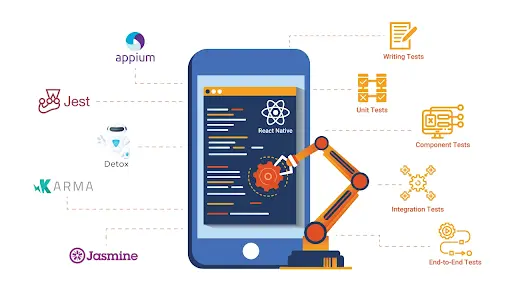Introduction
In today’s fast-paced world, mobile app development has become a crucial aspect of business growth and customer engagement. However, the process of developing and testing mobile apps can be time-consuming and prone to human errors. This is where mobile app automation comes to the rescue. Automation tools and frameworks can significantly enhance the efficiency and reliability of the app development process. In this blog, we’ll explore the benefits of mobile app automation and discuss some popular automation techniques.
What is Mobile App Automation?
Mobile app automation involves using software tools and frameworks to automate various tasks in the app development lifecycle. It aims to minimize manual effort, improve testing coverage, accelerate time-to-market, and enhance the overall quality of mobile applications. Automation can be applied to areas such as functional testing, performance testing, UI testing, and continuous integration/continuous delivery (CI/CD) processes.
Benefits of Mobile App Automation
- Increased Efficiency: Automation eliminates the need for manual execution of repetitive tasks, allowing developers to focus on more critical aspects of app development. It reduces human error, improves productivity, and speeds up the overall development process.
- Improved Test Coverage: With automation, it becomes easier to create and execute test cases that cover a wide range of scenarios. Automated tests can simulate user interactions, validate functionality, and identify potential bugs or issues more effectively than manual testing. This leads to improved app quality and a better user experience.
- Faster Time-to-Market: Automation enables rapid and frequent testing, which accelerates the app release cycle. Automated testing can be integrated into the CI/CD pipeline, allowing developers to quickly identify and fix issues, and deliver updates and new features to users more efficiently.
- Cost Savings: While there might be an initial investment in setting up automation infrastructure and tools, the long-term benefits outweigh the costs. By reducing the need for manual testers and minimizing the occurrence of post-release issues, automation helps save costs associated with bug fixes and customer support.
Popular Mobile App Automation Techniques
- Functional Testing: Automation frameworks like Appium, Selenium, and Espresso enable developers to write automated test scripts that simulate user interactions with the app. These scripts can be executed across multiple devices and platforms, ensuring consistent functionality and reducing regression issues.
- Performance Testing: Tools like Apache JMeter and Gatling allow developers to automate load testing and measure the performance of mobile apps under various scenarios. This helps identify performance bottlenecks, optimize app performance, and ensure a smooth user experience even under heavy usage.
Conclusion
Mobile app automation has become a game-changer for organizations striving to deliver high-quality apps efficiently and quickly. By automating various tasks in the app development lifecycle, businesses can minimize manual effort, improve test coverage, accelerate time-to-market, and enhance the overall quality of their mobile applications. Embracing automation tools and frameworks empowers developers to focus on innovation and create exceptional user experiences in today’s competitive mobile landscape.




